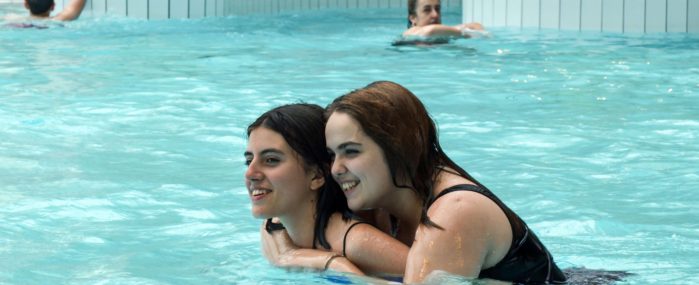




Dir.: Sebastien Lifshitz; Documentary; France 2019, 135 min.
Five years in the making Sebastien Lifshitz’ longterm observation of two unrelated teenagers from the small town of Brive-la-Gaillarde (Corrèze) is an illuminating study of human development, and through their personal stories, a snapshot of life in France between 2013 and 2018.
Emma and Anaïs come from very different backgrounds: middle-class Emma lives with working parents who are always stressed-out by the demands of their jobs, particularly her mother who hothouses her at school, pushing for top marks in a conflict that runs through the whole film. Plump Anaïs has an obese mother who tries, unsuccessfully, to make her daughter diet. With two younger siblings to look after Anaïs rarely sees her father due to his shift work. Schoolwork dominates their lives: Both teens spend most of their time worrying about exam results. The French education system has many cut-off points, like the old 11plus in the UK, forcing the kids to pass endless tests to qualify for the next stage. Emma has her eye on being in dance or theatre; Anaïs hopes to become a Kindergarten teacher.
In the summer holidays, Emma is packed off to her family’s holiday home to skate-board and enjoy the time off. But for Anaïs there is no time for play – domestic work taking the place of her studies – she has to help her mother whose health gradually deteriorates due to cancer. In January 2015, France is rocked by the killing of Charlie Hebdo journalists. Anaïs reacts in a mature way to the killings, defending ordinary Muslims, and citing the Muslim supermarket clerk who saved Jews by hiding them from the Islamist attackers. She is adamant that organised religion is to be blamed for many wars.
Meanwhile, both teenagers do well at school, passing their exams. Although she was worried about failing, Anaïs gets better marks than Emma. Both chose vocational careers, and Anaïs is interested in teaching infants, there is a warning not to get too close to the kids. She will later change course and chose geriatric care: ”having grown up a lot”. Affairs of the heart are similarly traumatic for both girls with both suffering in their first attempts at dating.
The Balaclan concert massacre in November 2015 brings shock waves through their school life once again. Emma is slacking a bit– and her mother is not pleased – Anaïs’ grandmother dies, and she is caught in the crossfire with her brother Tiimeo. Meanwhile Emma and her mother continue their slanging matches, although her acting is going well. She gravitates towards becoming a Director of Photography, or film director – driving her to despair. The reaction to Macron’s election victory in 2017 is very different in both households: Emma’s father talks about Mitterand’s victory in 1981, and the great political involvement of his generation; Emma is less enthusiastic “As long as it is not Le Pen, it’s OK”. But there is despair in Anaïs’ household: father and daughter slumping onto the sofa claiming “It’s all for the Rich”.
With the final examinations round the corner, Anaïs mother makes a last attempt to prevent her daughter from leaving – but in vain. The results again show Anaïs getting better results than Emma, finishing with Merit. Emma only has one offer – from a university in Paris – to study film, her mother showing her disappointment in the strongest possible way. The girls meet up for a goodbye chat near the lake. Both complaining that the “Fourteen-year-olds of today seem to have slept with half the South/West coast”. They both even contemplate moving back to Brive to bring up their kids.
This personal history lesson is luminously photographed by Antoine Parouty and Paul Guilhaume, with director Lifshitz always looking over the shoulder of the main protagonists, picking up every detail and nuance in a naturalistic tour de force. Despite its lengthy running time of over nearly three hours, Adolescence is an engrossing and valuable endeavour, documenting adolescence from a female perspective, informing and entertaining in equal parts. AS
GRAND JURY PRIZE WINNER | MY FRENCH FILM FESTIVAL 2021 | LOCARNO FILM FESTIVAL PREMIERE | SEMAINE DE LA CRITIQUE AUGUST 2019